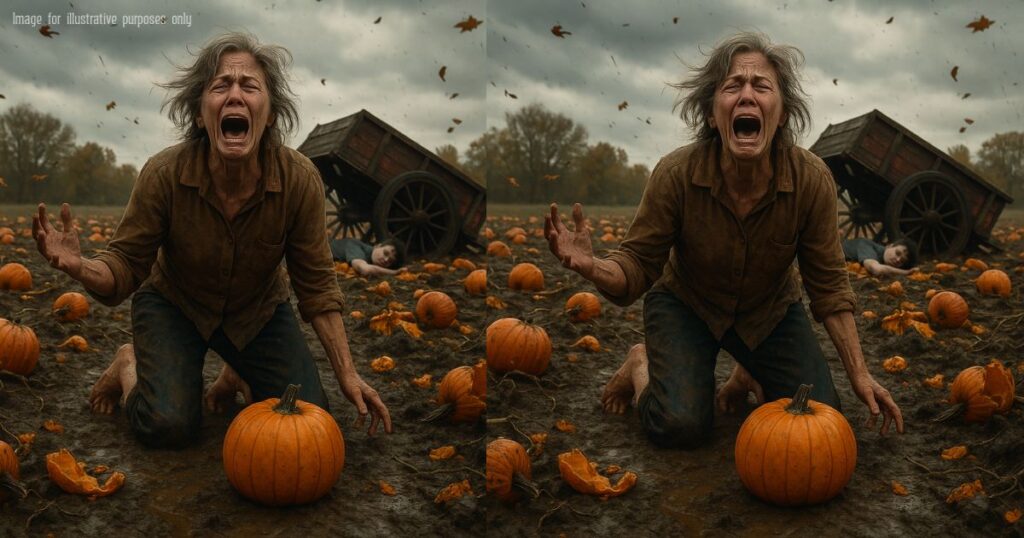It was late November. The leaves had all fallen. What pumpkins hadn’t rotted in the field were now soft and sunken, left for the crows and the frost.
I’d been avoiding the barn — too many memories in that place. But that day, I went in to clean. Not because I wanted to. Because I couldn’t stand the smell of decay anymore.
His jacket was still hanging by the feed sacks. Faded denim, sleeves too short now, the left pocket stitched with green thread — my own hand, years ago, after a tear he swore he didn’t make.
I reached in, hoping to find maybe a candy wrapper, maybe a note, some scrap of the boy he was.
What I found was a folded sheet of wide-ruled notebook paper. Wrinkled, soft at the edges. The top was labeled in his careful print:
“What Home Means to Me – English II”
I didn’t read it all at once. My hands shook too bad. I had to sit on the hay bale by the door, the cold biting into my legs, the quiet pressing in. But eventually, I opened it. I still remember every word.
“Home is dirt. Not the kind you clean off your shoes, but the kind that gets under your fingernails and stays there. Home is the smell of pumpkins in the morning and coffee in the barn. It’s Grandma’s hands, cracked from work but soft when she pats your back after a long day.”
“People talk about success like it’s some building with windows and lights. I think success is when a six-year-old picks your pumpkin and calls it ‘the best one.’”
“The world feels too fast sometimes. Like it forgot about patches and porches. But not here. Not yet.”
“I hope I can keep it going. I hope people remember this place when I’m gone.”
I read that line over and over. “When I’m gone.”
I don’t know how long I cried, but the wind had picked up by the time I stood. I pressed that paper to my chest, and for the first time since the accident, I didn’t feel empty. I felt full of something else. Grief, yes — but also purpose.
The next morning, I painted a new sign. Not “CLOSED.” Not “FOR SALE.”
I painted:
“Ben’s Patch — Pick Your Own. No Charge.”
The first car came the following week. A mother and her little girl, about nine, with pink boots and a matching hat. I was out back checking the compost when I heard their voices. I peeked around the shed, unsure whether to go greet them or let them wander.
“Are you open?” the mother asked gently, seeing me.
I nodded.
“My daughter saw your sign,” she said. “She wanted to pick one. Just one.”
I walked them through the field. Most of the good pumpkins were gone, but the girl didn’t mind. She touched each one with care, like she was waking them up from sleep. When she found her pick — a small, pale-orange one with green speckles — she looked at me and whispered, “This one’s perfect.”
Before they left, the mother pressed a ten-dollar bill into my palm.
“It says ‘no charge,’” I told her.
She smiled through tears. “Then let me donate to whatever kept this place open. Because it’s not just the pumpkins, is it?”
Word spread fast after that. Small towns are good for that. Kids started showing up again. Some from the school where Ben once went.
Some whose parents had grown up picking here and never thought they’d get the chance again. They brought laughter with them. And boots. And dogs.
One Saturday, a group of high schoolers came to help clean the field. Said they wanted to “honor Ben.” I handed them gloves and old rakes. By noon, we’d made more progress than I had in a year.
One of them — tall boy with braces and too much energy — pointed at the rotted hay bale and said, “You ever think of turning this into a learning garden? Like for schools?”
I hadn’t. But now I couldn’t stop thinking about it.
The county tried again to buy the land that winter. Offered more money than I’d ever seen.
I sent back a copy of Ben’s essay instead.
They never replied.
By spring, the patch had become more than just a place to pick pumpkins. It became a kind of memory garden. There were benches now. One carved from old tractor wood that said “Ben’s Spot.”
There were wind chimes made from rusted tools and a mural painted by kids that showed a boy kneeling in a field, hand resting on a pumpkin, smile wide like the sky.
I still missed him every day. That kind of missing doesn’t go away. It just changes shape. It fits into new places — like the way I talk to kids now, or how I leave extra cider by the fence just in case.
Sometimes I sit by the scarecrow and read his letter out loud, especially when no one’s around. And when the wind moves through the stalks, I swear I can hear him laughing.
One afternoon in early October — exactly a year later — a little boy picked a lopsided pumpkin and turned to his mom.
“This one looks like Uncle Doug’s belly!” he giggled.
She laughed. “Then it’s perfect.”
I had to bite my lip to keep from crying.
I don’t pretend the pain is gone. But it no longer controls me. Grief, I’ve learned, is a terrible gardener. But if you work beside it — if you keep showing up — something beautiful still grows.
That patch gave me my grandson. And then, somehow, he gave it back to me.
Final line:
“I thought the patch died with him. Turns out, it was just waiting for me to believe again.”


